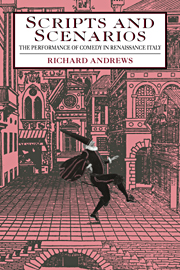Crossref Citations
This Book has been
cited by the following publications. This list is generated based on data provided by Crossref.
Anderson, Michael
1995.
The Law of Writ and the Liberty.
Theatre Research International,
Vol. 20,
Issue. 3,
p.
189.
Brand, Peter
and
Pertile, Lino
1997.
The Cambridge History of Italian Literature.
Campbell, Julie D.
1997.
Love's VictoryandLa Mirtillain the canon of renaissance tragicomedy: an examination of the influence of salon and social debates.
Women's Writing,
Vol. 4,
Issue. 1,
p.
103.
Andrews, Richard
1997.
The Cambridge History of Italian Literature.
p.
277.
Katritzky, M. A.
1999.
Aby Warburg's ‘Costumi teatrali’ (1895) and the Art Historical Foundations of Theatre Iconography.
Theatre Research International,
Vol. 24,
Issue. 2,
p.
160.
Tylus, Jane
2000.
Theater and its Social Uses: MachiavellisMandragolaand the Spectacle of Infamy*.
Renaissance Quarterly,
Vol. 53,
Issue. 3,
p.
656.
Johnson, Eugene J.
2002.
The Short, Lascivious Lives of Two Venetian Theaters, 1580-85.
Renaissance Quarterly,
Vol. 55,
Issue. 3,
p.
936.
Ellis, Anthony
2003.
The Comic Old Man in a Medicean Context: Lorenzino, the Florentine “New Brutus,” and ARIDOSIA.
Forum Italicum: A Journal of Italian Studies,
Vol. 37,
Issue. 1,
p.
40.
2003.
The Manly Masquerade.
p.
225.
2003.
The Manly Masquerade.
p.
1.
2003.
The Manly Masquerade.
p.
37.
2003.
The Manly Masquerade.
p.
189.
2003.
The Manly Masquerade.
p.
119.
2003.
The Manly Masquerade.
p.
159.
2003.
The Manly Masquerade.
p.
79.
Roe, John
2003.
A Companion to English Renaissance Literature and Culture.
p.
287.
2003.
The Manly Masquerade.
p.
281.
Bernard, John
2006.
Writing and the Paradox of the Self: Machiavelli’s Literary Vocation*.
Renaissance Quarterly,
Vol. 59,
Issue. 1,
p.
59.
Burdorf, Dieter
Fasbender, Christoph
and
Moennighoff, Burkhard
2007.
Metzler Lexikon Literatur.
p.
112.
McClure, George
2010.
Heresy at Play: Academies and the Literary Underground in Counter-Reformation Siena*.
Renaissance Quarterly,
Vol. 63,
Issue. 4,
p.
1151.





